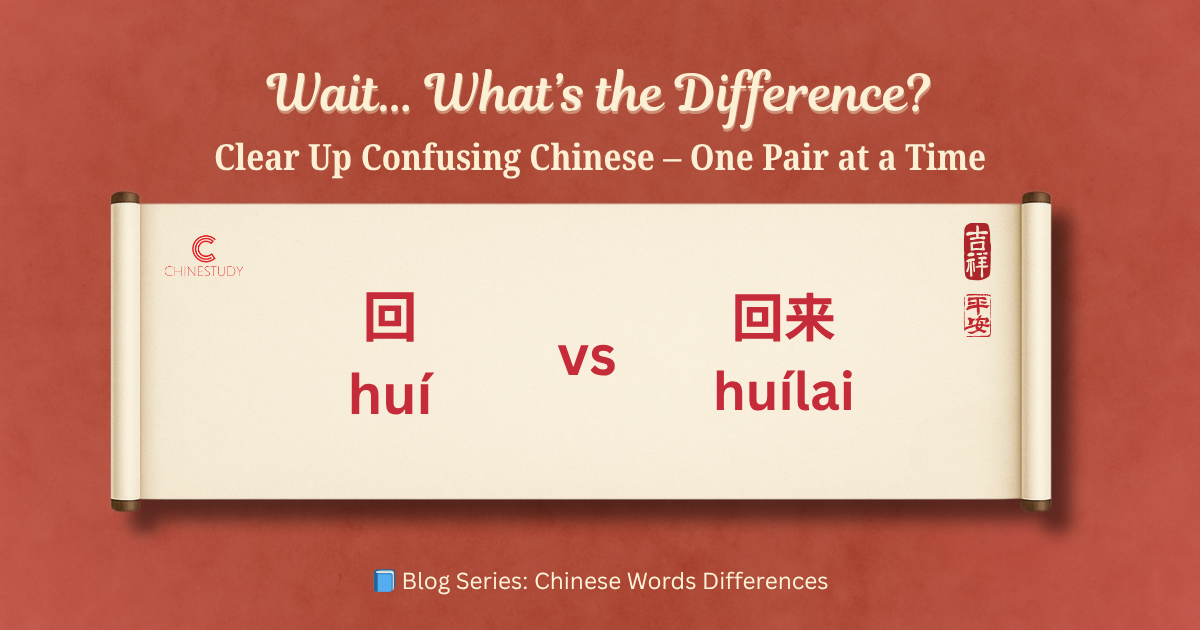🔄 回 huí vs 回来 huílai – What’s the Difference?

Wait… Aren’t they both “come back”?
They are related — but not always interchangeable!
Let’s break them down step by step. ⬇️
🔍 Breakdown
🟡 回 (huí) – “to return / go back”
- More general and flexible
- Often used alone or with a place
- Can mean “go back” or “come back” (depending on context)
🧱 Structure:
• 回 + place (e.g. 回家, 回国)
• Can be used in all kinds of directions: toward or away
🟢 回来 (huílai) – “to come back (to here)”
- Focuses on coming back to the speaker’s location
- More directional and specific
- Always implies returning to where the speaker is
🧱 Structure:
- Subject + 回来
- Subject + 回来 + verb (optional)
📝 Think of 回 as “return in general,” and 回来 as “come back here.”
💬 Easy Examples
✅ 回 (huí) - Subject + 回 + place
1. 我想回家。
(Wǒ xiǎng huí jiā)
→ I want to go home.
2. 他昨天回国了。
(Tā zuótiān huí guó le)
→ He returned to his country yesterday.
3. 明天我就回北京。
(Míngtiān wǒ jiù huí Běijīng)
→ I’ll return to Beijing tomorrow.
🟡 These don’t specify where the speaker is — just the destination.
✅ 回来 (huílai) - Subject + 回来 + verb (optional)
1. 他回来了!
(Tā huí lai le!)
→ He came back! (to where I am)
2. 快回来吃饭!
(Kuài huí lai chī fàn!)
→ Come back quickly to eat!
3. 你什么时候回来?
(Nǐ shénme shíhou huí lai?)
→ When will you come back (here)?
🟢 These all imply returning to the speaker’s location.
⚠️ Common Mistakes (Watch Out!)
❌ Wrong: 我想回来北京。
(Wǒ xiǎng huílai Běijīng)
→ ❗️Don’t use 回来 with a place. 回来 is used alone or followed by a verb.
✅ Correct: 我想回北京。
(Wǒ xiǎng huí Běijīng)
→ I want to return to Beijing.
🧭 Use 回 (huí) when you mention a specific place you’re returning to — like a city, country, or home.
🎯 Try It Yourself!
Choose the better word: 回 (huí) or 回来 (huílai)
1.
我明天 _______ 中国。
(Wǒ míngtiān _______ Zhōngguó)
✅ Correct answer: 回
👉 Returning to a place — not necessarily where the speaker is now.
2.
你几点 _______?
(Nǐ jǐ diǎn _______?)
✅ Correct answer: 回来
👉 It shows the person is coming back to your location (the speaker).
3.
他刚刚 _______,你去看看他。
(Tā gānggāng _______ , nǐ qù kànkan tā)
✅ Correct answer: 回来
👉 He just came back — near the speaker.
🚀 Final Tip
- Use 回 when you’re just talking about returning somewhere.
- Use 回来 when the person is coming back to your location.
💡 Quick trick:
- 📌 If you can say “come back here” in English, use 回来.
- 📌 If it’s just “go/return to a place,” use 回.
Just one word can flip your meaning — don’t miss the rest of the series! 👉 check them out here! 😄📘
Thank you for subscribing!
Have a great day!